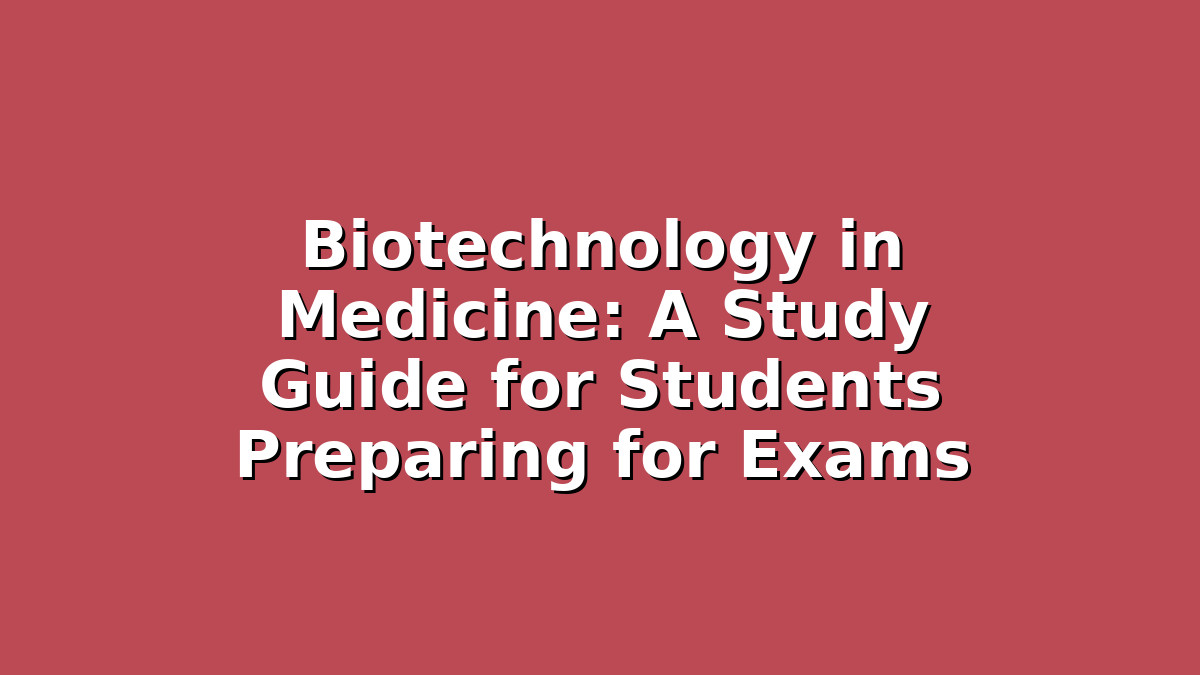Introduction
Biotechnology in medicine is one of the most exciting and rapidly evolving fields in science today. As students preparing for exams, understanding this interdisciplinary area not only enriches your knowledge but also opens up numerous career opportunities in healthcare, research, and pharmaceuticals. Whether you are studying biology, biochemistry, or health sciences, grasping the fundamental concepts and applications of biotechnology in medicine will give you a significant advantage in your exams and future studies.
This article will guide you through the key aspects of biotechnology in medicine, with practical study tips tailored to help you absorb and retain complex information effectively. We will explore three main sections: the basics of biotechnology, its medical applications, and strategies to master the topic for exams. Let’s dive in!
Section 1: Understanding the Basics of Biotechnology in Medicine
Biotechnology involves using living organisms, cells, and biological systems to develop products and technologies that improve human health. In medicine, biotechnology spans gene therapy, recombinant DNA technology, diagnostics, and vaccine development, among others.
Key Concepts to Focus On:
– DNA and genes: Learn the structure and function of DNA, how genes code for proteins, and how genetic information is inherited.
– Recombinant DNA technology: Understand how scientists manipulate DNA to combine genes from different organisms for therapeutic purposes.
– Cell culture and cloning: Familiarize yourself with growing cells in controlled conditions and producing genetically identical cells or organisms.
– Biomolecules: Study proteins, enzymes, and antibodies and their roles in biotechnology.
Study Tips:
– Create detailed mind maps linking key concepts such as genes, proteins, and biotechnology techniques.
– Use flashcards to memorize terminology and definitions related to biotechnology.
– Watch animated videos or online tutorials that explain complex processes visually, as this helps in retaining information better.
– Relate concepts to real-life examples, such as how insulin is produced using recombinant DNA technology.
Section 2: Medical Applications of Biotechnology You Should Know
Biotechnology has transformed medicine by enabling precise diagnosis, innovative treatments, and personalized medicine. Some of the most important applications include:
1. Gene Therapy
Gene therapy involves correcting defective genes responsible for disease development by inserting, altering, or removing genes within a patient’s cells. This technique offers potential cures for genetic disorders such as cystic fibrosis, muscular dystrophy, and certain types of cancer.
2. Vaccines and Immunotherapy
Biotechnology has revolutionized vaccine development by creating safer and more effective vaccines, such as mRNA vaccines for COVID-19. Immunotherapy also uses biotechnology to enhance the immune system’s ability to fight diseases like cancer.
3. Diagnostic Techniques
Techniques like PCR (polymerase chain reaction) and DNA sequencing allow for rapid and accurate diagnosis of infections, genetic disorders, and cancers. Understanding these tools is crucial for grasping modern medical diagnostics.
4. Production of Therapeutic Proteins
Biotechnology enables the production of proteins like insulin, growth hormones, and monoclonal antibodies used in treating diseases ranging from diabetes to autoimmune disorders.
Study Tips:
– Create comparison charts highlighting traditional vs. biotechnological methods in medicine.
– Summarize case studies of successful gene therapy or vaccine development to understand real-world applications.
– Practice answering past exam questions on biotechnology applications, focusing on explaining processes and benefits.
– Join study groups to discuss ethical considerations in biotechnology, which is often a topic in exams.
Section 3: Effective Study Strategies for Mastering Biotechnology in Medicine
Given the complexity of biotechnology, it is common for students to feel overwhelmed. Here are some study strategies that can help you master the topic confidently:
1. Break Down Complex Concepts
Divide broad topics into smaller, manageable sections. For example, when studying gene therapy, focus separately on vectors used, delivery mechanisms, and examples of diseases treated.
2. Use Active Recall and Spaced Repetition
Instead of passively reading your notes, quiz yourself regularly and revisit topics over spaced intervals. Apps like Anki can be particularly helpful for memorizing scientific terms and processes.
3. Apply What You Learn
Try to explain biotechnology concepts aloud as if teaching a peer. Teaching others reinforces your own understanding and highlights areas that need more practice.
4. Integrate Visual Learning Tools
Draw diagrams of processes like DNA replication, gene editing (CRISPR), and immune responses. Visual aids make it easier to remember sequences and complex interactions.
5. Connect Theory to Current Events
Stay updated with recent advances in biotechnology, such as new therapies or breakthroughs. Linking your studies to current news makes the information more relevant and engaging.
6. Manage Your Time Efficiently
Create a study timetable that allocates specific periods for biotechnology topics, mixing them with other subjects to maintain motivation and prevent burnout.
Conclusion
Biotechnology in medicine is a fascinating field with immense potential to revolutionize healthcare. As a student, mastering this topic not only helps you excel in exams but also prepares you for a future in science and medicine. By understanding the basics, exploring key applications, and adopting effective study strategies, you can approach your biotechnology studies with confidence and curiosity.
Remember, consistent effort and an active learning approach are the keys to success. Use the tips in this guide to build a strong foundation, and don’t hesitate to seek help from teachers or peers when concepts become challenging. Embrace the complexity of biotechnology as an opportunity to develop critical thinking and problem-solving skills that will serve you well beyond your exams.
Keep pushing forward—you’ve got this!

Responses